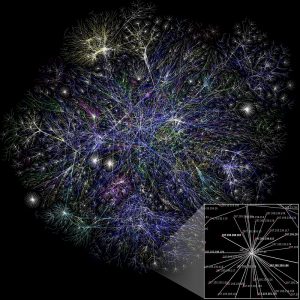
Map of Internet Connections, 2005 – Illustration is from the Opte Project, created by Barret Lyons to map the complexity of Internet connections. Originally from the English Wikipedia; https://commons.wikimedia.org/w/index.php?curid=25698718
When I launched Steampunk Desperado two months ago, I decided to avoid political posts, my goal being to promote our books without courting controversy. But when freedom of expression is at stake, I’ll make an exception. I’ve reversed my opinion from my March 2015 post on my earlier blog “Sci-Fi and Sedition.”
Hail, hail, the FCC has just voted to repeal the “net neutrality” rules enacted in 2015 by the Obama Administration. Net neutrality forbids service providers from charging different rates for different levels of Internet service. They might be inclined to do so because some applications – HDTV for example – require a very high bandwidth. Many people oppose such differential rates, out of fear that the big players, for example, digital content providers like Hulu and Netflix, will hog all the bandwidth, leaving smaller providers out in the cold.
In 2015, I felt that this fear was misguided, because Internet bandwidth is not a fixed-sized pie. Capacity has been steadily increasing to meet demand. As long there is competition, the little guy won’t get squeezed out. At the time, I did express concern about the customer’s connection, the so-called “last mile.” Competition is an issue because of state and local governments’ encouragement of telephone and cable monopolies. Many of us have only three choices – phone, cable, and satellite. In many remote areas, there is exactly one Internet provider.
Another argument against net neutrality was the allegation, mostly by conservatives and libertarians (see Alex Jones’ infowars.com) is that it’s part of a plan to control speech by eventually regulating or licensing websites. As it happened, that wasn’t necessary. Gigantic corporations such as the Facebook, Amazon, Netflix, and Google (known collectively as FANG’s) now dominate the on-line landscape. These companies have been quick to regulate content based on “community standards” with an obvious partisan bias, even when doing so costs them customers. For a monopoly or near-monopoly, power becomes more of a consideration than money,
On the good side, none of the FANG’s have an actual monopoly – yet. Customer dissatisfaction with corporate speech policing has led to new outfits such as Infogalactic, the non-leftist version of Wikipedia, and Gab, the free-speech alternative to Twitter. On a level playing field, the free speech would have the advantage. But what if the FANG’s use their market power to entice Internet providers to block their fledgling competitors? Taking on the big guys is difficult enough. Newcomers often fail to get any traction, such as Vid.me, the You-Tube alternative that recently folded.
I’m obviously a free-market guy. If I weren’t, I wouldn’t be inclined to celebrate the Victorian Era with its “sweatshops” and so-called “robber barons.” Libertarian theorists like Murray Rothbard have shown that government regulation frequently has the opposite of its stated effect, with regulations favoring the big corporations over the interlopers. On the other hand, anti-trust legislation can be a positive thing, the breakup of the AT&T telephone monopoly being a prime example. My current preference would be to restore net neutrality rules until we have genuine competition at the local level for at least 90% of Americans. I doubt I’ll get my wish. Hopefully, the horror stories won’t come to pass, but if they do, don’t say I didn’t warn you.
What’s your take on Net Neutrality? Pro, Con or Yawn?



































